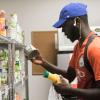Say Cheese! Artisan Cheesemaking Grows in Georgia
The Locavore

Photo Credit: Brian Dean
Rock House Creamery is part of the new but growing artisan cheese industry in Georgia.
When Tyler Davis’ family bought “fancy” cheese growing up, it was Cracker Barrel brand cheddar from a chain grocery store, destined for making mac and cheese. Davis, who is now head cheesemaker and owner of Hobo Cheese Company in Covington, has developed a more refined palate for cheeses since then, and he is one of a handful of Georgia-based cheesemakers who are looking to infuse a little cheese culture into our local food economy.
“There hasn’t historically been much of a cheesemaking tradition down here. There’s less demand overall in the South,” Davis says. Local cheese shops are commonplace in states like New York, Wisconsin and Vermont, where dairy farms dot the landscape, and cheese plays a more central role in food culture.
That may explain why, among the array of foods grown, raised and sold in the Athens area, local cheese is hard to come by. Nature’s Harmony Farm in Elberton has been quietly producing small batches of farmstead cheese since 2007, drawing the attention of artisan cheese lovers when its cheddar and Alpine cheeses took home a slew of regional and international awards in 2014, including the Flavor of Georgia contest. Yet the celebration of locally made cheese has been slow to spill into larger markets. That may be changing as more artisan cheesemakers are popping up in farmers markets and smaller grocery stores in northeast Georgia.
“The artisan cheesemaking community has been growing over the last 10 years,” says Jessica Kennedy, the dairy manager at Rock House Creamery. Kennedy was a dairy inspector with Georgia’s Department of Agriculture for 20 years before switching gears to the production side. She witnessed the number of cheesemaking licenses grow as Atlanta grew.
Rock House was formed in 2016, taking over a 75-year-old, family-run dairy farm. Kennedy says the company is still focused on maintaining a small herd of 100 cows. She prefers the family farm approach to raising animals.
“If you want to be a small farmer who feeds his cows and tends to his cows, you have to be small,” she says. “We don’t push our animals for production. They get their grain ration in the morning, and the rest of the time they’re in the pasture eating grass.”
Rock House produces around 160 pounds of cheese a week, much of which is sold in the company’s storefront location, Farmview Market, in Madison. It currently makes three hard cheeses—gouda, cheddar and tomme—along with cheese curds and spreadable fromage.
The creamery would love to expand to grocery stores in Athens. The problem, says Kennedy, is that it’s hard for small-batch cheesemakers to meet the demand requirements set by larger grocery store chains. “You’re not just supplying the Publix in Greensboro, it’s every Publix in the region,” she says, and Rock House isn’t there yet.
The National, Five & Ten and Heirloom Café carry both Hobo and Rock House cheeses. Rock House is also sold at Ideal Bagel, the Oconee County location of Mama’s Boy and KiKi’s Bakeshop in Watkinsville, and Hobo’s Davis is a vendor at the Athens Farmers Market on Saturdays.
Davis opened Hobo in part to help build up the cheesemaking trade in the South and support local dairying. “Small dairy farms in Georgia have taken a hit recently, and we want to create an outlet and demand for high-quality milk,” he says.
The northern states have a leg up, says Davis, because their cooler climates support the types of grasses that grow year-around, ideal for dairy farming and cheesemaking. But Georgia has its advantages, too.
“We have really good conditions for growing microbes,” he says. “It’s warm and humid a large part of the year, and different types of microbes do well in that. I think there’s a lot you can do down here. It’s just learning to work with the conditions we have.”
Davis draws inspiration from the cheeses popular in Italy and the Mediterranean, where the warm and humid climate mirrors the U.S. South. His flagship cheese, Banjo, is similar to a mozzarella, and his second cheese resembles feta.
“I love cheesemaking,” says Davis. “It’s bridging the gap between that raw product and converting it into a finished food. It’s definitely a craft.”












comments